
Education is widely considered the key to unlocking a brighter future, but for many Filipinos, the journey isn’t so easy.
A recent survey by data forensics company, The Nerve, found* that 86% of Filipinos navigating work and studies want to upskill, but wanting and being able to learn are two different things.
According to the survey, many Filipinos drop out before they can finish their studies due to financial struggles, time constraints, and the need to earn an income. These force them to face a difficult choice between education and survival. Despite the desire to learn, many working students find themselves stuck and not being able to develop skills to further their careers.
The risk of dropping out is even higher for part-time students who are likely to face the greatest financial strain compared to full-time students and full-time workers.
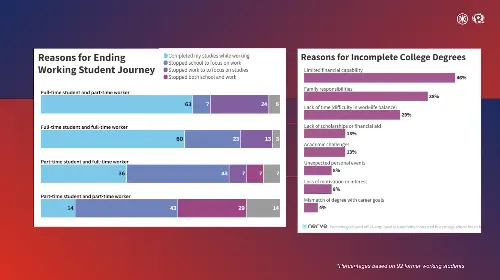
This isn’t just a personal struggle but a nationwide concern. The World Economic Forum’s (WEF) The Future of Jobs Report 2025 found that 68% of Filipinos need to upskill, higher than the global average of 59%. Unfortunately, only 38% of the country’s workers were found to have completed training.
So if the path to success is for working students to upskill, how exactly are time and financial struggles hindering them?
Time and financial struggles as the biggest hurdles
The Nerve’s study found that most can barely dedicate more than five hours per week to learning due to the demands of their careers.
Time proves to be the biggest challenge in balancing work and studies, as indicated by 56% of the respondents. Physical and mental health concerns were also significant among each category, proving that balancing work and studies can take a toll on one’s well-being.
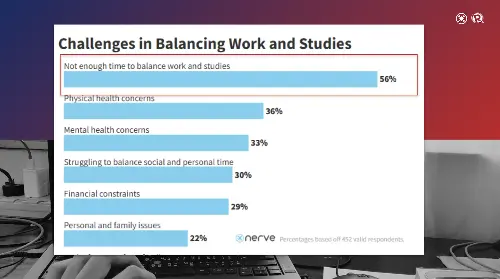
Financial constraints also force many to prioritize work over studies. Because of these challenges, many end up in jobs unrelated to their studies. This makes it harder to bridge the gap between academic learning and career experience.
On the flip side, the desire for an education to progress is there. The Nerve’s survey found that gaining financial independence was a motivation for 56% of the respondents to pursue work and studies at the same time. It was followed by the need to gain real-world experience (46%), and then for career advancement. (41%). Helping to improve their family’s lives is also deemed a motivation for 35% of the respondents.
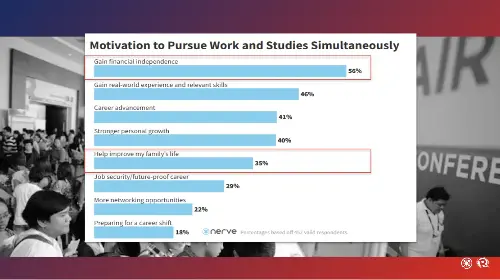
Despite their ambition, working students are stuck in a system that simply wasn’t designed for them. Unless barriers are addressed, they could continue to fall behind. Luckily, the survey also found the following areas to support Filipino working students.
Four key areas to uplift working students
1. Flexibility
Flexibility in work and study schedules is the most critical support needed across all survey respondents. Without flexible schedules, students risk burnout or dropping out. A system that allows them to learn at their own pace with online learning options could make a significant difference.
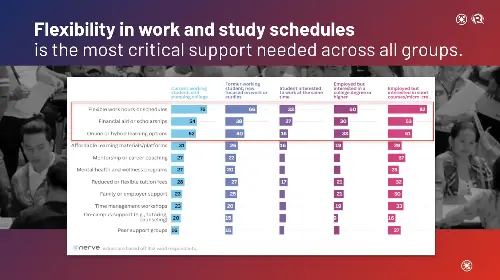
2. Career Growth
It’s not just about earning money, it’s about building a future. The Nerve survey shows that working students who had jobs related to their field of study were more likely to finish their degrees. This proves that education shouldn’t just be about theory, it must be tied to practical, real-world experience that prepares students for long-term success.
3. Continuity
Learning shouldn’t end at graduation. Today’s job market demands continuous upskilling. A culture of lifelong learning should be upheld through micro-credentials, employer-backed education, and training.
4. Accessibility
Financial aid and scholarships remain critical. Expenses like gadgets, books, and tuition all add up. Accessible scholarship opportunities, flexible tuition plans, and employer-backed education programs can help with this issue.
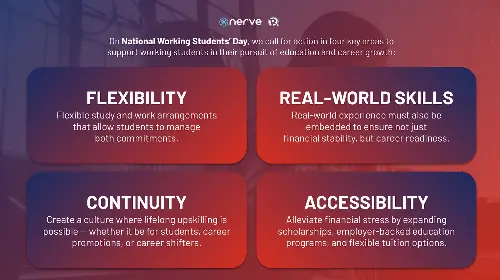
Ultimately, the Filipino workforce will be shaped by how well today’s workforce can be upskilled and supported. The question is no longer whether people want to learn – because they do. But the real challenge lies in making sure they have the opportunities to make that possible.
One school bridging this gap is Mapúa Malayan Digital College (MMDC), a fully online college that offers a modern BS Information Technology degree, which equips students with the relevant skills needed to thrive in today’s tech-driven business landscape, especially for working students who are striving for career and financial growth.
Understanding the unique challenges of working students, MMDC offers flexible class schedules so learners can balance work and studies effectively. The college also utilizes a Projects, Problems, and Cases (PPC) approach, replacing traditional exams with practical outputs, ensuring that what they learn in the classroom can easily be applied in the real world.
To further enhance the learning experience, MMDC integrates AI-powered tools and high-quality content from leading global universities and organizations, providing students with a world-class education that meets the evolving demands of the modern workforce.
Expanding opportunities beyond degree programs, Mapúa Malayan Digital College has launched the Career Leap Pad Certification Program, a curated collection of internationally recognized microcredential courses designed to equip learners with high-demand digital skills. The program includes Virtual Assistance, Social Media Marketing with Meta, Digital Marketing & E-Commerce with Google, Content Creation with Adobe, and Data Analytics with IBM.
These industry-aligned certifications empower non-graduate job seekers, working professionals, and career shifters with the skills they need to thrive in today’s digital economy.
Committed to making quality education more accessible, MMDC offers a range of scholarship programs and flexible payment options to help working students achieve their academic and professional goals without financial strain.
With its forward-thinking approach, Mapúa Malayan Digital College continues to break educational barriers, empowering working students to learn, upskill, and succeed in the digital age. Start today at https://www.mmdc.mcl.edu.ph.
Are you also trying to upskill for a brighter future? Share your Step Up stories online and together, let’s inspire and empower each other to pursue further education. – Rappler.com
*Based on a survey conducted by The Nerve from February 13 to 28, 2025, with 452 respondents
